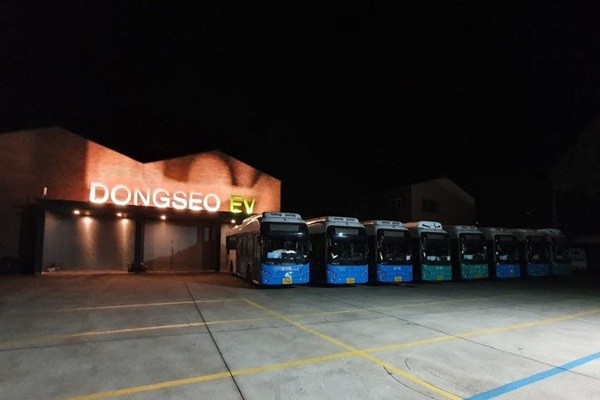Many electric buses in South Korea now have more than 300,000 kilometrage without having to go through single battery replacement.
The domestic batteries installed in these buses, which have been in operation up to five years as buses on regular routes, have lasted 1.5 times more than the lifespan of a battery that has been known so far and their performance is still considered satisfactory. Economic feasibility of these buses is about 36% greater than normal buses with internal combustion engines.
It is expected that this case will not only improve residual value of electric vehicles and electric vehicle batteries, but it will also act as a positive factor in resolving any anxiety over electric vehicle battery’s lifespan.
According to a transportation company in Seogwipo called Dongseo Transportation, 30 electric buses out of 59 electric buses that were introduced between May of 2016 and August of 2018 and are currently in operation now have more than 300,000 kilometrage. Because the kilometrages of other 29 electric buses are also nearing 290,000 km, it is expected that all 59 buses will have more than 300,000 kilometrage by the end of this year.
Out of 59 electric buses, 36 of them are regular electric buses with batteries (163 kWh) that were introduced in 2018 while the rest of them are electric buses that can automatically replace batteries and have separate batteries (102 kWh) attached.
By the end of July 14, kilometrages of some of regular electric buses were 348,275 km, 348,394 km, 359,087 km, 360,103 km, and 361,106 km. Kilometrages of some of buses with interchangeable batteries were 310,218 km, 309,436 km, 308,661 km, 307,697 km, and 306,941 km.
The battery capacities (102 kWh and 156 kWh) of these electric buses are smaller than that of electric buses (200 kWh) that have come out on the market recently. As a result, these buses drive for 320 km on average daily while traveling back and forth from Jungmun-dong and Namwon-eup and they need to be recharged for every 70 to 80 km. This indicates that these buses have gone through 4,500 to 5,000 charges and discharges that are 1.5 times more than the number of charges and discharges that the industry guarantees which is at 3,000.

According to Dongseo Transportation, economic feasibility of its buses in operation is the one that stands out the most. While it costs $33,400 (40.18 million KRW) based on $0.87 (1,042 KRW) per liter of diesel annually to fill up a bus with an internal combustion engine that drives 300 km every month, it only costs $23,300 (28 million KRW) to operate its electric bus based on the same condition.
The company also stated that an annual fixed cost per bus that includes costs to replace engine oil and various filters is between $8,320 (10 million KRW) and $9,990 (12 million KRW). This indicates that it will cost between $83,200 (100 million KRW) and $99,900 (120 million KRW) to operate a regular bus for ten years.
On the other hand, it almost costs nothing to replace parts of an electric bus as it does not use parts that a regular bus would use. However, because battery system needs to be replaced every ten years, it will cost about $41,600 (50 million KRW) to replace battery system of an electric bus with 163 kWh battery capacity ($250 (300,000 KRW) per kWh). Ultimately, it will cost between $416,000 (500 million KRW) and $433,000 (520 million KRW) to operate a regular bus while it will only cost about $275,000 (330 million KRW) to operate an electric bus for ten years.
Dongseo Transportation is a transportation company that has replaced the most regular buses with electric buses since 2016. All 59 of its electric buses were supplied by Edison Motors and they all use batteries from LG Chem. It is heard that the battery that is applied with the lamination and stacking method has higher energy density than a battery based on the winding method and it has a long lifespan as it does not swell. In addition to these strengths of the battery, temperature management of battery pack, constant management of charging and discharging status, and regular driving pattern help extend lifespans of Dongseo Transportation’s electric buses.
“Although the battery capacities of our electric buses are lower than that of current electric buses as they are five years old at the most, they are still in good condition as they have regular driving patterns and go through frequent maintenance checks.” said a representative for Dongseo Transportation. “Because performance of most of their batteries is still in good condition, they will be able to for another 100,000 km.”
Because it has been only six to seven years since the first electric vehicle was introduced in South Korea, there is yet to be any case of an electric vehicle reaching its limit in kilometrage. Because there are many vehicles with more than 300,000 kilometrage, it is expected that residual values such as depreciation of electric vehicles and electric vehicle batteries will go up. Also, it is expected that an anxiety surrounding lifespans of electric vehicle batteries will start to fade away.
Staff Reporter Park, Taejoon | gaius@etnews.com